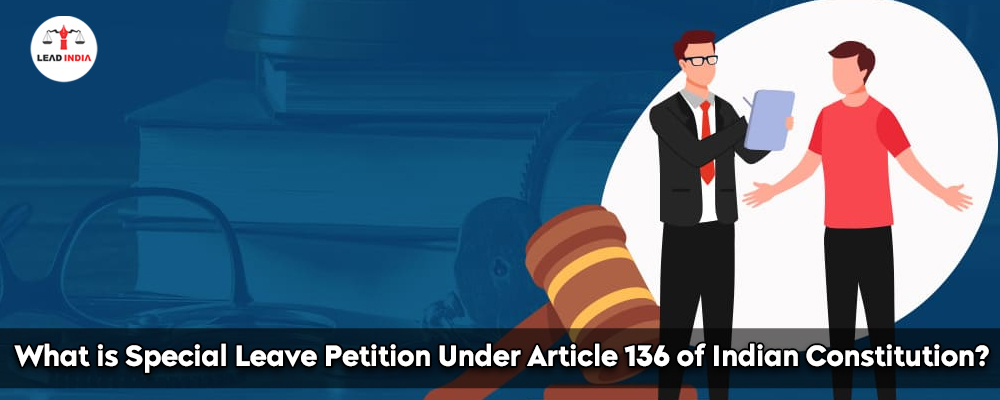The duties, authority, and jurisdiction of the Supreme Court of India are outlined in Chapter IV of Part V of the Indian Constitution, entitled “The Union Judiciary.” A person may not agree with the decision rendered by the state’s high court or any tribunal for a variety of reasons. Special Leave Petition under Article 136 of the Indian Constitution may serve as a remedy in certain situations. Article 136 covered appeals are heard by India’s highest court, i.e., the Supreme Court.
Special Leave Petition: About
- Special Leave Petition under Article 136 of the Indian Constitution, the Supreme Court of India is endowed with extraordinary jurisdiction. The Supreme Court may, at its discretion, grant special leave to appeal from any judgment, decree, sentence, or order in any cause or matter, passed or made by any court or tribunal in the Indian territory.
- The Supreme Court has the authority to hear appeals by granting special permission against any judgment or order issued by any High court or tribunal in the nation under the residuary provision of Article 136. The Apex Court has the discretionary authority to guarantee that there is no miscarriage of justice under the Special Leave Petition.
Need A Legal Advice
The internet is not a lawyer and neither are you. Talk to a real lawyer about your legal issue

Grounds for Filing Special Leave Petition under Article 136 of the Indian Constitution
One may file a Special Leave Petition for a number of reasons, such as:
- Significant legal issues of broad concern.
- Mistakes made when interpreting and applying the law.
- Fundamental rights are violated.
- A case of injustice done.
- Decisions rendered by various High Courts that conflict.
- Matters concerning a large amount of public attention.
Who Can File a Special Leave Petition under Article 136 of the Indian Constitution?
- A party who feels wronged may file a Special leave Petition in opposition to the ruling or order that denies them a certificate. where there is a serious legal issue or where there has been egregious injustice, an SLP case may be brought.
- This gives the harmed party special permission to appeal a court or tribunal decision anywhere in India’s jurisdiction to the Apex Court and have their case heard.
- The party who feels wronged must provide a list of dates as well as a concise summary of the case’s facts and concerns.
Requirements to File Special Leave Petition under Article 136 of the Indian Constitution
- The Supreme Court needs all the information in a special leave petition in order to determine whether or not to grant the SLP.
- The Advocate on Record (AoR) must sign the petition.
- The petitioner ought to declare that no other petition has been filed with the high court.
- The petitioner ought to certify that the annexures submitted with the SLP are accurate copies of the pleadings that were filed in the subordinate courts.
- The judgment that will be the subject of the appeal must have the special leave petition attached.
Time Limit to File Special Leave Petition under Article 136 of the Indian Constitution
- Ninety days from the date of the High Court’s verdict or order is the deadline for filing an SLP.
- The time limit for filing an SLP against a High Court ruling that denies a certificate of fitness for appeal is sixty days from the date of the decision that denies the certificate.
Procedure to File Special Leave Petition under Article 136 of the Indian Constitution
Drafting the SLP
The SLP must be written in accordance with the guidelines and must expressly identify the grounds for the appeal.
Obtaining a Certificate
In certain circumstances, the SLP may not be able to proceed without a certificate from the High Court. This certificate attests to the fact that there are important legal issues at stake in this case.
Filing the SLP
A copy of the SLP is forwarded to the opposing party and filed in the Supreme Court.
Serving to Opposite Party
A notice of the SLP is served to the opposing party, who is then given a chance to reply.
Hearing
The matter moves on for a hearing if the Supreme Court grants special leave and determines that the case raises significant legal issues or other legitimate grounds.
Both civil and criminal cases may issue special leave petitions; nevertheless, the Supreme Court must decide criminal matters with particular caution and expertise. Unless the courts have breached the due process of law, the Supreme Court cannot get involved.
One can talk to lawyers from Lead India for any kind of legal support. In India, free legal advice online can be obtained at Lead India. Along with receiving free legal advice online, one can also ask questions to the experts online free through Lead India.





 Talk to a Lawyer
Talk to a Lawyer